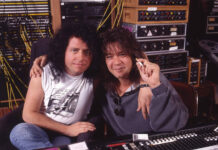
Five Essential St. Vincent Songs That Guitarists Need to Hear
Annie Clark has never been an easy artist to pin down. She’s made knotty, abstract pop albums inspired by domesticity, Disney-inspired chamber pop slathered in heaps of distortion, and ’70s throwback records inspired by the likes of David Bowie’s Young Americans. She’s been a hired hand for indie heavyweights like Sufjan Stevens and collaborated with Talking Heads’ David Byrne. She even co-wrote a hit song with Taylor Swift – Eras Tour favourite, Cruel Summer.
READ MORE: Five essential Pixies tracks that guitarists need to hear
If there’s a connective thread through everything she does, however, it’s her inimitable guitar playing style. Since the release of her debut album Marry Me in 2007, Clark has built a reputation as an idiosyncratic indie shredder, juxtaposing beautiful, often elaborately orchestrated music with often noisy and intense leads. And with each subsequent album, she continues to reshape her approach, whether delving into synth-laden pop on 2017’s MASSEDUCTION or treating everything to a sepia tint in 2021’s Daddy’s Home.
Clark’s proficiency and technique is always in the service of the song, however, and while she’s rarely lets an opportunity to let loose and let the riffs fly go to waste, she’s as adept a songwriter as she is a player, leaving no loose ends or unresolved threads throughout her body of work. In this edition of Start Me Up, we have five songs to get to know the unique sound of a uniquely unconventional guitar hero.
Start Here: Birth In Reverse (St. Vincent, 2014)
There are two ways to hear Birth In Reverse, the lead single from St. Vincent’s eponymous 2014 album. The first is as a two-chord pop song – simple, direct, big on hooks and undeniably catchy. The other is as an unceasing showcase for Annie Clark’s breathtakingly intricate yet often harsh, squealing guitar licks.
Both are true, of course, but once you notice the array of flourishes, dramatically timed pauses or textural scratches she adds, or how often she uses the simplicity of a pop song as a runway for gravity-defying fretwork, it’s hard to hear the song as anything but three minutes and 16 seconds of Clark’s skills on full display. As a piece of songwriting, it’s airtight – perfectly constructed and with a reverence for melody. Which makes it all the more dazzling when she gives it a good, playful scuffing.
Then go Here: Actor Out of Work (Actor, 2009)
St. Vincent’s second album Actor found Clark working with John Congleton for the first time, beginning a fruitful partnership that would extend to her next two albums. His input helped Clark refind her focus after she lost faith in material resulting from a previous session with a different producer, which Congleton said sounded like outtakes from The Lion King, per her 10-year reflection on making the album.
Clark also wrote Actor Out of Work after Congleton encouraged her to write a new song in one night, the spontaneity of which brought about one of her most enduring singles. Driven initially by a one-note guitar riff, Actor Out of Work covers a surprising amount of ground in two minutes, incorporating layers of vocals, twinkling background synths and a recurring, ultra-distorted riff inspired by Brian Eno’s Here Come the Warm Jets. There’s still magic and wonder in this ambitious piece of art pop, but The Lion King this most certainly isn’t.
Stop Off Here: Surgeon (Strange Mercy, 2011)
Clark approached the writing of her third album through sensory deprivation, holing up in a studio in Washington and committing herself to working on new ideas for 12 hours each day. She even attempted to overcome writer’s block by transcribing the entirety of Madonna’s debut album.
Whatever method she used to get there, Clark ended up delivering one of her most creatively bold statements in Strange Mercy. Its greatest moment is first single Surgeon, which for the entirety of its first verse finds Clark keeping her powder dry and including no recognizable guitar at all. It’s within the first chorus that she begins to unravel an effortlessly dizzying series of riffs at once technical and fluid, fingerpicking a sliding melody that’s as much funk as folk. Everything escalates from there, achieving a righteous climax with effects dialed to 11, groove locked in, and a closing solo launching straight into the stratosphere.
Almost Home: Your Lips Are Red (Marry Me, 2007)
Annie Clark finished recording her debut album after going on tour with ecstatic indie choir The Polyphonic Spree and subsequently was asked to perform in Sufjan Stevens’ band on the strength of her performances. An elaborate set of art-pop defined as much by its use of piano, strings and horns as her own guitar leads, the ambition and scope of Marry Me quickly found Clark drawing comparisons to Kate Bush and with good reason – it’s one of the most intricately stunning debut albums of the 00s.
It also occasionally features moments of intense, torturous guitar playing like that of Your Lips Are Red. As with much of the album, it’s as much about the overall production as Clark’s own signature playing style. Yet she offers herself the indulgence of particularly gnarly riffs here, her squealing, rhythmically tangled performance the most abrasive moment on the record overall. When performed live, it grows into an even more chaotic and confrontational piece, a thrilling highlight that’s remained a staple of her sets for over 15 years.
Nightcap: Krokodil (Single, 2012)
Despite wearing some of her most abrasive influences on her sleeve—including covers of songs by Big Black and The Pop Group in addition to revealing her Tool and Pantera fandom in a BBC segment – Annie Clark has often tempered her most intense guitar freakouts with more delicate melodies or graceful flourishes of strings or horns.
That’s not the case with Krokodil, however, which was issued as a standalone single following the release of the previous year’s Strange Mercy. It’s easy to see why this one didn’t make the tracklist of that album—it’s searing and ferocious, seething and cacophonous. At a baseline her guitar tends to sound like a jet engine; here, it’s more like a rocket launch, its infectious riffs distorted beyond reason, set against an uptempo punk-rock pulse that drives her carnivorous cravings: “You’re mine, by the shine of my bloody teeth.”
The post Five Essential St. Vincent Songs That Guitarists Need to Hear appeared first on Guitar.com | All Things Guitar.
Source: www.guitar-bass.net











